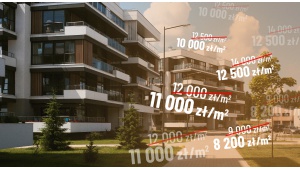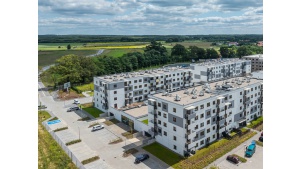MIPIM TAKEAWAYS
Prestige PR
Włodarzewska 81C lok 81
02-393 Warszawa
i.wisniewska|prestigepr.pl| |i.wisniewska|prestigepr.pl
508 927 958
www.prestigepr.pl
Poland still on investors' radar
A tentative, moderate optimism was noticeable in the mood at MIPIM. There was a lot of talk about Poland in the context of a stable, economically strong market, providing good conditions for real estate investment. As a result, we anticipate the entry of more new players into the Polish market this year.
Strong pipeline
Based on our own projects and discussions with other market participants, we observe that numerous properties across various sectors are currently in the bidding, due diligence, or even finalization phase. However, these projects are not large-scale or spectacular in nature; nevertheless, as the market conditions improve, we anticipate such projects to emerge. Despite this, we remain optimistic about the number of transactions and hope that the investment volume in 2024 will surpass that of 2023, signaling growth in the subsequent years. Nonetheless, it is expected to take some time to return to the full liquidity seen in previous years.
Pricing adjustments
The most significant challenge over the past two years has been the disparity in price expectations between sellers and buyers. Some wanted to sell at pre-pandemic prices, while others sought discounts due to current market condition. This discrepancy often delayed the finalization of many transactions. However, such an impasse was unsustainable, necessitating deals to occur. Consequently, we are witnessing more compromises on pricing from both sides. While time has played a role in this adjustment, the market is still not witnessing significant discounts akin to those seen in other European countries. This reaffirms Poland's robust and steadfast position in the international real estate arena.
Awaiting interest rates to drop
Will it not get any worse? The market is currently awaiting a potential decrease in interest rates, anticipated in the second half of the year. This would signal the return of more affordable financing and likely stimulate increased investor activity. Presently, the main concern lies not in the availability of capital but rather in its cost. Until interest rates begin to decline, the market is not expected to operate at its full capacity. However, once rates do decrease, we can anticipate a surge in purchasing activity. Therefore, those who are well-prepared, having thoroughly analyzed the market and identified promising assets, will be poised to capitalize on this opportunity. Being better prepared than the competition to swiftly make offers and finalize deals will be crucial in emerging as winners in this scenario.
Who is buying in Poland?
Amid the current economic, geopolitical, and macroeconomic landscape, the most active buyers in the Polish market are "value-add" investors and those seeking projects requiring improvement with solid asset management potential, promising higher returns in the future. Notably, local capital from Central and Eastern Europe remains the most active in Poland, while investors from Western Europe primarily focus on opportunities within their home countries. Interestingly, there is a growing presence of smaller investment entities, such as family offices from European countries, and a long-awaited increase in involvement from investors with Polish capital. These latter groups predominantly target smaller commercial properties. High-net-worth individuals (HNWIs) in Poland have recognized the potential for profit in commercial real estate, sometimes even surpassing returns from residential properties.
Retail is back
The retail sector, particularly the retail park and convenience segment, remains a focal point in the real estate discussions. In 2023, it ranked second in terms of transaction volume, with approximately 50% of deals involving smaller retail formats. As of mid-March this year, Poland has already seen 3 transactions involving such assets, with Avison Young playing a prominent role as the advisor on the selling side. Furthermore, additional projects are slated for finalization in the near future.
Retail parks continue to be regarded as a reliable and secure investment option, often offering a more cost-effective entry point, with the average transaction value typically ranging between €5-15 million. What should be highlighted, despite challenges such as the COVID-19 pandemic, the war in Ukraine, and inflation, the retail sector has demonstrated remarkable agility in adjusting prices to meet buyer expectations.
Office sector in waiting mode
Are offices in crisis? While there remains an appetite for office assets, the market is highly selective, with investors carefully seeking out opportunities. Deals are taking longer to materialize. Interestingly, 2023 saw a surge in completed transactions in Warsaw, but we observe now growing investor interest in regional cities as well, evidenced by ongoing discussions between sellers and buyers. Notably, there is a noticeable absence of "core" capital, with more activity seen among "value-add" and opportunistic investors, who are prudent in their approach and seek out opportunities without overpaying for assets. The Avison Young team has several compelling office deals available for sale and is actively seeking capital interested in such assets. The key to revitalizing the office sector will likely be a reduction in interest rates, which would spur a return of larger-scale office building transactions.
Industrial sector – not exactly setting the market on fire
In the warehouse sector, the disparity between the price expectations of sellers and buyers is particularly visible. While transactions are occurring, their scale is somewhat limited due to this misalignment. Investors seem to be taking longer to reconcile their price expectations, and there is a notable absence of major players capable of executing large-scale deals exceeding €100 million.
New alliances, new projects
There is a noticeable trend towards the development of new collaboration models among investors, developers, and property owners. The market is actively seeking alternative solutions and transaction structures to facilitate investment. Consequently, we are witnessing the emergence of new platforms, such as those for Private Rented Sector (PRS) or "student housing", and an increase in joint-venture projects. These collaborative efforts allow entities to share the investment costs, thereby enhancing liquidity and enabling the pursuit of additional projects or the expansion of scale directly.

Łotewski producent wysokiej jakości domów prefabrykowanych wchodzi na polski rynek

Deweloperzy ukrywają ceny mieszkań. Z troski o klientów czy swoje portfele?

Więcej przestrzeni, mniej hałasu – dlaczego Polacy coraz częściej wybierają przedmieścia?
Więcej ważnych informacji
 Jedynka Newserii
Jedynka Newserii

 Jedynka Newserii
Jedynka Newserii

Polityka

D. Joński: Nie wiemy, co zrobi Rosja za dwa–trzy lata. Według duńskiego wywiadu może zaatakować kraje nadbałtyckie i musimy być na to gotowi
Zdecydowana większość krajów unijnych wskazuje na potrzebę wzmocnienia zdolności obronnych Europy w obliczu coraz bardziej złożonego geopolitycznego tła. Wywiady zachodnich państw wskazują, że Rosja może rozpocząć konfrontację z NATO jeszcze przed 2030 rokiem. Biała księga w sprawie obronności europejskiej „Gotowość 2030” zakłada m.in. ochronę granic lądowych, powietrznych i morskich UE, a sztandarowym projektem ma być Tarcza Wschód. – W budzeniu Europy duże zasługi ma polska prezydencja – ocenia europoseł Dariusz Joński.
Transport
Duże magazyny energii przyspieszą rozwój transportu niskoemisyjnego w Europie. Przyszłością może być wodór służący jako paliwo i nośnik energii

Zmiany w europejskim transporcie przyspieszają. Trendem jest elektromobilność, zwłaszcza w ramach logistyki „ostatniej mili”. Jednocześnie jednak udział samochodów w pełni elektrycznych w polskich firmach spadł z 18 do 12 proc., co wpisuje się w szerszy europejski trend spowolnienia elektromobilności. Główne bariery to ograniczona liczba publicznych stacji ładowania, wysoka cena pojazdów i brak dostępu do odpowiedniej infrastruktury. – Potrzebne są odpowiednio duże magazyny taniej energii. Przyszłością przede wszystkim jest wodór – ocenia Andrzej Gemra z Renault Group.
Infrastruktura
W Polsce w obiektach zabytkowych wciąż brakuje nowoczesnych rozwiązań przeciwpożarowych. Potrzebna jest większa elastyczność w stosowaniu przepisów

Pogodzenie interesów konserwatorów, projektantów, inwestorów, rzeczoznawców i służby ochrony pożarowej stanowi jedno z największych wyzwań w zakresie ochrony przeciwpożarowej obiektów konserwatorskich. Pożary zabytków takich jak m.in. katedra Notre-Dame w Paryżu przyczyniają się do wprowadzania nowatorskich rozwiązań technicznych w zakresie ochrony przeciwpożarowej. W Polsce obowiązuje już konieczność instalacji systemów detekcji. Inwestorzy często jednak rezygnują z realizacji projektów dotyczących obiektów zabytkowych z uwagi na zmieniające się i coraz bardziej restrykcyjne przepisy czy też względy ekonomiczne.
Partner serwisu
Szkolenia

Akademia Newserii
Akademia Newserii to projekt, w ramach którego najlepsi polscy dziennikarze biznesowi, giełdowi oraz lifestylowi, a także szkoleniowcy z wieloletnim doświadczeniem dzielą się swoją wiedzą nt. pracy z mediami.




![Nestlé w Polsce podsumowuje wpływ na krajową gospodarkę. Firma wygenerowała 0,6 proc. polskiego PKB [DEPESZA]](https://www.newseria.pl/files/1097841585/fabryka-nesquik_1,w_85,r_png,_small.png)




.gif)

 |
| |
| |
|